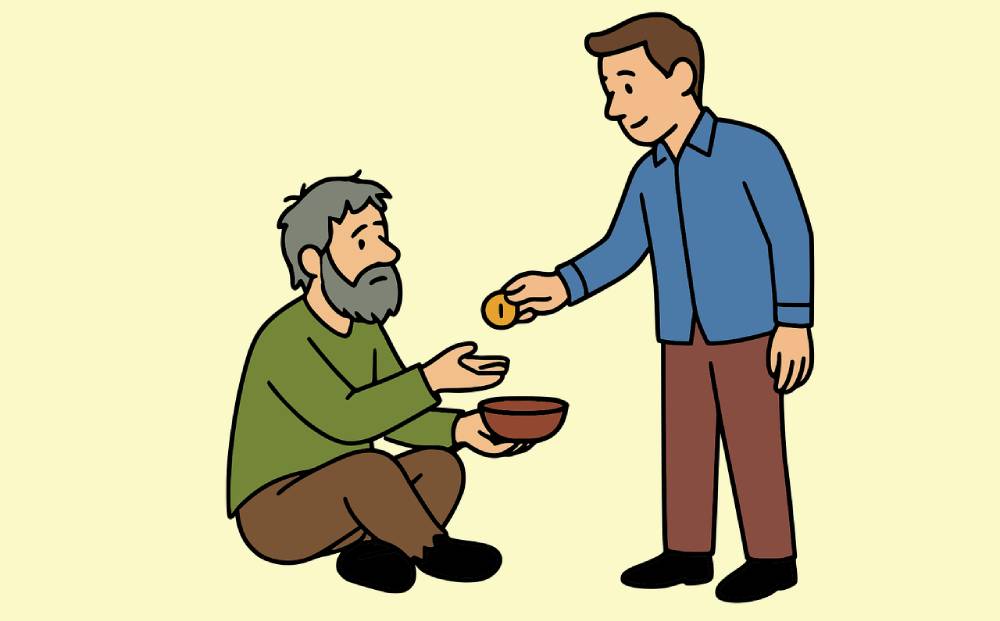I remember the day I learned what it truly means to be a cheerful giver. It was a Sunday morning, and I had exactly $20 to my name. The rent was due in three days, my car needed gas, and the pantry at home was nearly empty.
As the offering plate made its way toward me, I felt the familiar tug-of-war in my heart. Logic said, “Hold onto every penny.” But something deeper whispered, “Trust and give.”
With trembling hands, I placed the $20 bill in the plate. It wasn’t much to others, perhaps, but it was everything to me at that moment.
I wish I could say a check came in the mail that afternoon. Or that someone gave me cash as I left church. That didn’t happen. What happened was much more valuable. I felt a deep peace and joy that went beyond my circumstances.
For the first time, I understood what Paul meant in 2 Corinthians when he wrote that “God loves a cheerful giver.”
My journey with giving didn’t start or end that Sunday. It’s been a winding path of learning to trust God. I’ve seen help come in surprising ways. Now, I find true joy in giving.
I’ve learned that cheerful giving is a powerful spiritual practice, no matter the season.
In this post, I’ll share what I’ve learned about being a cheerful giver. It’s not just about the what and how, but also the why behind God’s call to give joyfully.
Key Takeaways:
- God values the heart behind our giving more than the amount we give.
- The biblical principle of sowing and reaping applies to our giving.
- Cheerful giving comes from understanding God’s grace and provision.
- Everyone can begin their giving journey regardless of their financial situation.
- Growing in giving is a process that develops over time with faith and practice.
The Sacred Nature of Offerings

When I began to study what the Bible says about giving, I was surprised by how seriously God considers our offerings. Scripture consistently portrays gifts to the Lord as holy—set apart and sacred.
In the Old Testament, we see how mishandling offerings had serious consequences. Remember the story of Nadab and Abihu in Leviticus 10:1-2? They offered “strange fire” before the Lord and paid with their lives. Think about Ananias and Sapphira in Acts 5:1-5. They lied about their gift and faced quick judgment.
These sobering accounts teach us that our offerings aren’t casual transactions. They’re sacred acts of worship that reflect our relationship with God. When we give, we’re not just transferring resources—we’re participating in something holy.
“Honor the Lord with your wealth and with the firstfruits of all your produce; then your barns will be filled with plenty, and your vats will be bursting with wine.” – Proverbs 3:9-10 (ESV)
This verse reminds us that giving is fundamentally an act of honor toward God. See your offerings as sacred. This will help you give with respect, not hesitation.
This shift in perspective transforms giving from obligation to privilege.
The Principle of Sowing and Reaping

The core of biblical giving is a basic principle. It affects both the natural and spiritual worlds: the law of sowing and reaping. Paul captures this beautifully in 2 Corinthians 9:6 (ESV):
“The point is this: whoever sows sparingly will also reap sparingly, and whoever sows bountifully will also reap bountifully.”
This isn’t prosperity gospel—it’s spiritual physics. Like a farmer who plants few seeds, we can’t expect a big harvest from giving sparingly. The measure of our sowing determines the measure of our reaping.
I’ve seen this play out in my own life many times. When I give generously—money, time, love, and energy—I see rewards that far surpass my effort. Sometimes the return is the same, but often it’s surprising. It can come as opportunities, relationships, peace, or wisdom.
Jesus reinforced this principle in Luke 6:38 (ESV), saying:
“Give, and it will be given to you. Good measure, pressed down, shaken together, running over, will be put into your lap. For with the measure you use it will be measured back to you.”
Notice the vivid imagery here. Jesus doesn’t promise a modest or adequate return. He describes abundance that’s pressed down, shaken together, and running over!
The principle is clear: how generously we give determines how generously we receive.
Understanding God’s Role vs. Our Responsibility

A common belief that stops joyful giving is the mix-up between God’s role and our duty. Some Christians wait for God to change their lives. They think “God is in control” means they don’t have to act.
However, 2 Corinthians 9:10 (ESV) clarifies this relationship:
“He who supplies seed to the sower and bread for food will supply and multiply your seed for sowing and increase the harvest of your righteousness.”
Notice the division of labor here. God provides the seed—our resources, talents, abilities, and opportunities. But we must sow it. God doesn’t force the seed from our hands into the ground. That part is our responsibility.
I’ve learned that God doesn’t override our free will when it comes to giving. He offers resources and invites us to join His economy of abundance. But we decide how much to give—and whether to give at all.
When I understood my partnership with God, my giving changed from being passive to active. I realized that I wasn’t only doing a religious duty. I was working with God’s plan for blessings and support.
The Heart Behind the Gift

Perhaps the most important aspect of giving is the condition of your heart. Paul makes this crystal clear in 2 Corinthians 9:7 (ESV):
“Each one must give as he has decided in his heart, not reluctantly or under compulsion, for God loves a cheerful giver.”
The Greek word for “cheerful” here is “hilaros”—the root of our English word “hilarious.” God loves giving that springs from joy and delight, not duty or guilt.
I’ve given from both places. I’ve written checks while mentally calculating what I’d have to give up as a result. And I’ve given with a heart so full of gratitude that I could barely contain my joy. The experiences were worlds apart.
Why does God care so much about our attitude when giving? Because giving reveals what we truly believe about God’s character and provision. When we give cheerfully, we demonstrate our trust in Him as our Father in heaven who cares for our needs.
Jesus taught that “where your treasure is, there your heart will be also” (Matthew 6:21). Our giving and our hearts are inseparably linked. When we give willingly and cheerfully, it’s evidence that our hearts truly belong to God.
Growing in Your Giving Journey

One of the most freeing truths I’ve learned is that being a cheerful giver is a journey. It doesn’t happen overnight. Paul praised the Corinthian believers for giving according to what they had, not what they lacked (2 Corinthians 8:12).
Your giving journey might start with something small—perhaps $5 or $10. That’s perfectly fine. What matters is that you begin where you are, with what you have, offering it willingly.
As your faith grows, so will your giving. I started my giving journey with modest amounts that felt sacrificial at the time. Every step I took in obedience boosted my faith in God’s provision. This trust helped me give more over time.
Romans 12:8 encourages those who give to do so with “generosity.” This generosity develops as we repeatedly experience God’s faithfulness. Every time we give and see God’s provision, our ability to be generous grows.
If you’re new to giving, don’t feel discouraged. Even small contributions matter. Jesus praised the widow who donated two small coins. He valued her gift more than others, as she gave from her poverty (Luke 21:1-4). Your small beginning may be worth more in God’s economy than you realize.
Willingness Beyond Capacity

A great example of joyful giving is seen in the Macedonian churches Paul talks about in 2 Corinthians 8:1-5 (ESV):
“1 We want you to know, brothers, about the grace of God that has been given among the churches of Macedonia, 2 for in a severe test of affliction, their abundance of joy and their extreme poverty have overflowed in a wealth of generosity on their part. 3 For they gave according to their means, as I can testify, and beyond their means, of their own accord, 4 begging us earnestly for the favor of taking part in the relief of the saints— 5 and this, not as we expected, but they gave themselves first to the Lord and then by the will of God to us.”
These believers gave beyond their ability because of their overflowing willingness. They grasped God’s grace so well that they asked to give, even in their deep poverty.
Their example destroys the excuse that we need to wait until we have “enough” to give generously. They prove that cheerful giving flows from spiritual wealth, not material abundance.
Understanding what Jesus Christ gave for our salvation changes how we view giving. No financial gift can compare to the gift of eternal life. When we see God’s grace in Jesus, we respond with gratitude by giving. It’s a choice, not a chore.
Practical Application

So how do we put these principles into practice? How can we be cheerful givers in a world that promotes hoarding and self-protection?
First, pray specifically about your giving. Ask God to show you where and how to sow. Sometimes He’ll guide you to support your local church. Other times, He may lead you to help a person or give to a certain ministry.
Second, start where you are. Don’t withhold giving until your financial situation improves. Give according to what you have now, trusting God to multiply your seed. Even small acts of generosity plant important seeds.
Third, if you struggle with the desire to give, ask God to work on your heart. Philippians 2:13 promises that “it is God who works in you, both to will and to work for his good pleasure.” God can cultivate a willing heart if you’re open to His work.
Finally, record and remember God’s faithfulness. Keep track of how God provides after you give. These testimonies will strengthen your faith when you face future giving decisions.
I’ve found that giving becomes more joyful with practice. Every act of kindness loosens greed’s hold on us. It also boosts our trust in God’s care.
Testimonies of Faithful Giving
Stories of cheerful givers in Scripture and history inspire us. They encourage us to trust God with our resources.
Look at the widow of Zarephath in 1 Kings 17:7-16 (NIV). She shared her last meal with Elijah. Because of her kindness, she received endless supplies during the famine. Consider the boy who gave Jesus his five loaves and two fish. He saw them multiply and feed thousands.
I’ve seen similar miracles in my life. Checks showed up right when bills were due. New opportunities came after I gave up something. I also found peace, even when my finances looked bleak.
A standout moment happened when my wife and I donated generously to help a missionary family. The amount stretched our budget uncomfortably, but we felt compelled to give. Within two weeks, I received a work bonus equal to exactly twice what we had given. The amount wasn’t the point—it was God’s confirmation that He saw our sacrifice and honored our trust.
These testimonies aren’t guarantees that giving always results in immediate financial return. The harvest can take many forms: joy, peace, strong relationships, or spiritual growth. But they remind us that God is faithful to those who give cheerfully.
Conclusion
Being a cheerful giver isn’t about the size of your gift but the condition of your heart. God invites us to join His abundant economy. We do this by sowing generously and trusting Him with the outcomes.
Remember:
- Offerings to God are sacred acts of worship.
- The measure you use to give determines what you receive.
- God provides the seed, but we must sow it.
- Giving willingly and cheerfully pleases God.
- Everyone can begin their giving journey regardless of current circumstances.
- God is faithful to multiply what we sow in faith.
As you consider your own giving journey, I encourage you to take a step of faith today. Start where you are, give what you can with a cheerful heart, and watch how God works in and through your generosity.
Frequently Asked Questions
Q. Does “cheerful giver” mean I should always feel happy when giving?
A. Not necessarily. “Cheerful” in this context means giving willingly rather than under compulsion. It’s about your overall trust and gratitude. It’s not just a temporary feeling.
Q. What if I don’t have much to give?
A. God looks at the heart behind the gift, not the amount. Start with what you have, even if it seems small. Remember the widow who gave two small coins. Jesus said she gave more than the rich donors. She gave from her heart.
Q. Should I give even when I’m in debt?
A. This requires wisdom and possibly counsel from trusted financial advisors. Many financial counselors believe giving is still important in your financial plan, even if you have debt. Start small if necessary, but don’t stop giving altogether.
Q. Is tithing (giving 10%) still required for Christians today?
A. The New Testament doesn’t set a specific percentage, but it encourages giving generously and cheerfully. Many Christians see the tithe as a starting point. They care more about giving freely than sticking to a specific percentage.
Q. How do I develop a cheerful attitude toward giving if I currently give reluctantly?
A. Start by reflecting on God’s generosity toward you. Meditate on verses about God’s provision and faithfulness. Start with small gifts you give freely. Then, ask God to change your heart as you learn to give.
Q. Should I give only to my church or to other causes as well?
A. Scripture says we should support those who teach us spiritually. So, it’s important to help your local church. However, God may also lead you to give to the poor, widows, other ministries or specific causes. Pray for wisdom about where to direct your giving.






